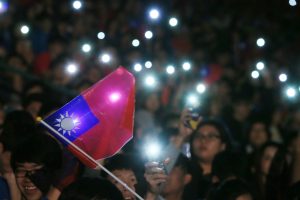Taiwan raided six travel agencies earlier this week for allegedly forging documents to facilitate the entry of Chinese government officials into Taiwan, the latest development in a case involving one of the island’s most notorious pro-unification figures.
Taipei authorities raided the offices of Huaxia Dadi Travel Service and five other companies. The Taipei District Prosecutors Office says the six agencies aided around 2,000 Chinese government officials seeking to enter Taiwan.
Huaxia Dadi is run by Chang Wei, the son of China Unification Promotion Party (CUPP) founder Chang An-le, the former head of the Bamboo Union criminal gang popularly known as “White Wolf.”
Last week, authorities raided five locations and detained 10 suspects over allegations the agencies had helped more than 5,000 Chinese citizens enter Taiwan between January 2017 and June 2019.
The raids come amid renewed scrutiny over possible attempts by Beijing to influence Taiwan’s upcoming January 11 presidential and legislative elections.
President Tsai Ing-wen of the Democratic Progressive Party (DPP) is favored in a contest against Kaohsiung Mayor Han Kuo-yu of the Kuomintang (KMT), who is seen as the favored candidate of Beijing.
Han traveled in March to meet government officials from Hong Kong, Macau, and China, a move sharply criticized by Tsai and the DPP. He calls for Taiwan to recognize the “1992 Consensus,” an alleged agreement between Beijing and Taipei that both sides agree there is “one China” but agree to disagree on what it means.
Tsai and her party reject the 1992 Consensus, claiming Beijing has made clear that it interprets the “1992 Consensus” as a “one country, two systems” arrangement in the mold of Hong Kong. Both Tsai and Han reject such a political model in Taiwan, but regularly spar over the parameters of Taipei’s relations with Beijing.
Ahead of the election, Chinese influence in Taiwan’s media, religious institutions, and local politics has been highlighted by DPP politicians and local and international media.
The DPP has moved to expedite the passage of an anti-infiltration bill, which would criminalize political participation or the disruption of social order by anyone supported by “infiltration sources.” The KMT and Beijing have criticized the bill.
The latest raids on travel agencies further highlight the concern of Taiwan authorities that the island’s politics are vulnerable to infiltration by pro-unification actors. The DPP often toes a cautious line when dealing with alleged Chinese influence, eager to punish infiltrators but vulnerable to criticism from voters concerned whether legislation may harm Taiwan’s democratic principles.
Taipei prosecutors brought the latest case to light last week when they detained 10 individuals, including a man they only identified as Hung, his surname.
The agencies allegedly charged each Chinese visitor NT$200 (US$66) to process their visits by collecting their personal information and submitting it to the National Immigration Agency to obtain entry permits for short-term exchange programs.
The agencies are charged with falsifying documents to obtain the entry permits.
Starting in August, Beijing restricted individual travel to Taipei, leading to a sharp drop in the number of Chinese nationals entering Taiwan. However, the island has seen record numbers of arrivals from other countries, especially Southeast Asian nations like the Philippines and Thailand, for whom Taiwan recently waived visa requirements.
Chang An-le, a colorful public figure, has received copious attention from media and authorities alike for his vocal pro-unification views and his close ties to prominent figures in China.
CUPP, his political party, remains firmly on the extreme fringes of politics in Taiwan, where unification with the People’s Republic of China remains a deeply unpopular proposition.
In September, a CUPP official was identified as a culprit after Hong Kong democracy activist Denise Ho was attacked with red paint at a rally in Taipei.
Chang himself is best known for public stunts. At a February protest, Chang displayed a casket meant to symbolize the deaths of Taiwanese soldiers should they be made to defend a Chinese invasion. The stunt went awry when Chang stumbled and fell into the casket.

































